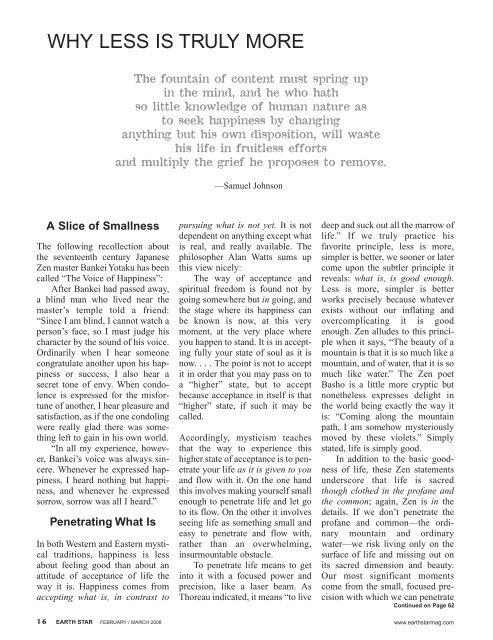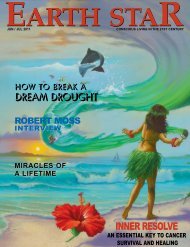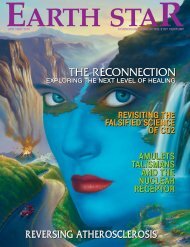GREGG BRADEN GREGG BRADEN - Earthstar
GREGG BRADEN GREGG BRADEN - Earthstar
GREGG BRADEN GREGG BRADEN - Earthstar
- No tags were found...
Create successful ePaper yourself
Turn your PDF publications into a flip-book with our unique Google optimized e-Paper software.
WHY LESS IS TRULY MOREThe fountain of content must spring upin the mind, and he who hathso little knowledge of human nature asto seek happiness by changinganything but his own disposition, will wastehis life in fruitless effortsand multiply the grief he proposes to remove.—Samuel JohnsonA Slice of SmallnessThe following recollection aboutthe seventeenth century JapaneseZen master Bankei Yotaku has beencalled “The Voice of Happiness”:After Bankei had passed away,a blind man who lived near themaster’s temple told a friend:“Since I am blind, I cannot watch aperson’s face, so I must judge hischaracter by the sound of his voice.Ordinarily when I hear someonecongratulate another upon his happinessor success, I also hear asecret tone of envy. When condolenceis expressed for the misfortuneof another, I hear pleasure andsatisfaction, as if the one condolingwere really glad there was somethingleft to gain in his own world.“In all my experience, however,Bankei’s voice was always sincere.Whenever he expressed happiness,I heard nothing but happiness,and whenever he expressedsorrow, sorrow was all I heard.”Penetrating What IsIn both Western and Eastern mysticaltraditions, happiness is lessabout feeling good than about anattitude of acceptance of life theway it is. Happiness comes fromaccepting what is, in contrast topursuing what is not yet. It is notdependent on anything except whatis real, and really available. Thephilosopher Alan Watts sums upthis view nicely:The way of acceptance andspiritual freedom is found not bygoing somewhere but in going, andthe stage where its happiness canbe known is now, at this verymoment, at the very place whereyou happen to stand. It is in acceptingfully your state of soul as it isnow. . . . The point is not to acceptit in order that you may pass on toa “higher” state, but to acceptbecause acceptance in itself is that“higher” state, if such it may becalled.Accordingly, mysticism teachesthat the way to experience thishigher state of acceptance is to penetrateyour life as it is given to youand flow with it. On the one handthis involves making yourself smallenough to penetrate life and let goto its flow. On the other it involvesseeing life as something small andeasy to penetrate and flow with,rather than an overwhelming,insurmountable obstacle.To penetrate life means to getinto it with a focused power andprecision, like a laser beam. AsThoreau indicated, it means “to livedeep and suck out all the marrow oflife.” If we truly practice hisfavorite principle, less is more,simpler is better, we sooner or latercome upon the subtler principle itreveals: what is, is good enough.Less is more, simpler is betterworks precisely because whateverexists without our inflating andovercomplicating it is goodenough. Zen alludes to this principlewhen it says, “The beauty of amountain is that it is so much like amountain, and of water, that it is somuch like water.” The Zen poetBasho is a little more cryptic butnonetheless expresses delight inthe world being exactly the way itis: “Coming along the mountainpath, I am somehow mysteriouslymoved by these violets.” Simplystated, life is simply good.In addition to the basic goodnessof life, these Zen statementsunderscore that life is sacredthough clothed in the profane andthe common; again, Zen is in thedetails. If we don’t penetrate theprofane and common—the ordinarymountain and ordinarywater—we risk living only on thesurface of life and missing out onits sacred dimension and beauty.Our most significant momentscome from the small, focused precisionwith which we can penetrateContinued on Page 6216 EARTH STAR FEBRUARY / MARCH 2008 www.earthstarmag.com
















